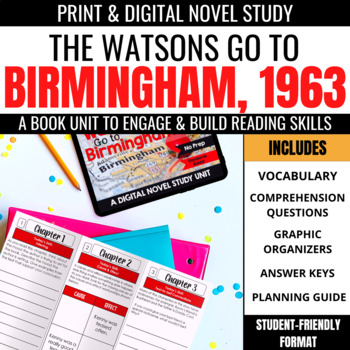The Watsons Go to Birmingham, 1963 Hybrid Novel Study: Comprehension Activities
- PDF
What educators are saying
Description
The Watsons Go To Birmingham, 1963 Novel Study includes comprehension questions and vocabulary activities to teach a literature unit with the book by Christopher Paul Curtis.
Standards-aligned and engaging, this isn't your typical book study. Instead of overwhelming learners with a list of daily chapter questions that don't require them to think beyond the text, The Watsons Go To Birmingham novel unit is meaningful and targets a specific comprehension skill each day.
Your download includes:
✔Daily comprehension prompts in 3 formats for differentiation
- Foldable trifold brochures
- Cut & paste journal prompts for interactive notebooks
- Google Slides for easy differentiation or digital classrooms
✔ Weekly word of the day flip books for text-based vocabulary
✔ Easy-to-follow directions for printing & prep
✔ Instructional planning guide
✔ Answer keys
In The Watsons Go To Birmingham Novel Study you'll find:
1) Student comprehension practice (up to 15 instructional days)
- Each day's work focuses on a single standards-based comprehension skill
- Short, written responses include opportunities to apply thinking to text
- Designed with reluctant and struggling learners in mind
- Built-in graphic organizers to support skill acquisition
- Approachable questions help make connections & start conversations
- No boring multiple-choice or fill-in-the-blank questions!
- Available in both printable trifolds, pasteable journal prompts, & Google Slides
2) Approachable practice with key reading standards and skills including:
- Generating main ideas and a summary of key events
- Text analysis and responding to literature
- Exploring character traits & development through events of the plot
- Making inferences and drawing conclusions based on text clues
- Utilizing context clues to establish meaning
- Analyzing point of view & its impact on the reader.
- And so much more!
3) Text-based & academic vocabulary
- One target word identified for each day's reading
- Includes opportunity to generate a personal definition & use the word in context
- Fosters vocabulary knowledge through synonyms & antonyms
- Opportunities to make connections to academic vocabulary for daily skills
4) Teacher support materials
- Unit scope & sequence lay out the day's comprehension & vocabulary focus
- Answer Keys for all comprehension activities
- Tips for preparation and implementation
- Optional guide for assigning in Google Classroom
-------------------------------------------------------------------------------------------
How Novel Units from Differentiated Teaching Work...
▸ Teachers can introduce the day's vocabulary word & discuss it before reading.
▸ Students complete just one section of the trifold or a single Google Slide each day.
▸ Daily work focuses on target skills needed for success in reading vs. plot recall.
▸ The low-pressure format provides novelty & encourages student engagement
▸ Less overwhelming to reluctant readers and writers
▸ Requires deep analysis and application of text-based knowledge
▸ Encourages discussion about skills & strategies
Here's why teachers love these novel units...
♥ I love this resource. My students are more focused on the concept when I use these trifold brochures instead of questions. The work I get is more thoughtful and contemplative because the emphasis is on quality answers, not a large quantity of answers. - Joanne C.
♥ This has helped me so much in teaching Holes to my students this year. Other resources overwhelm students with too much vocabulary and literal comprehension questions but these slides give students one vocabulary word for each chapter and a grade-level higher-order comprehension skill to practice. - Kristin P.
♥ I love Rebecca's novel studies and this one is no exception. It has been so great to have a reliable resource that I know I can come to when I need something to do with my students to help them with reading skills. - Kayla
Here's what homeschool families have to say about the novel studies...
★ I LOVE the layout and how it guides my son and I through our reading time. As a homeschool parent, I still wanted to give him that opportunity to discuss and grapple with the text and I love this quick format as a brochure. I also love the vocab focus for each section and the skill listed so I can monitor his understanding of these as we move through a variety of texts this year. - Antonia S.
★ My kids LOVED this book companion. The vocabulary was rich, and I liked the focus on one word a day. I also liked that they had to use context clues rather than dictionary definitions... The tasks were a great review of skills I covered throughout the year. Parent-friendly and easy to implement. - Corinne M.
★ I am a homeschool mom and my daughter is enjoying the book and I am loving that she is able to respond to the reading through various aspects and not just answer questions. She is more engaged in her reading and asks more questions after she completes each task. - Terri B.





